|
FIRST, THE NEWS: |
 |
RUSSIA TO FUND SMALL-SCALE REPLICA HAGIA SOPHIA IN SYRIA THAT WILL BE USED AS A CHAPEL
from: The Art Newspaper
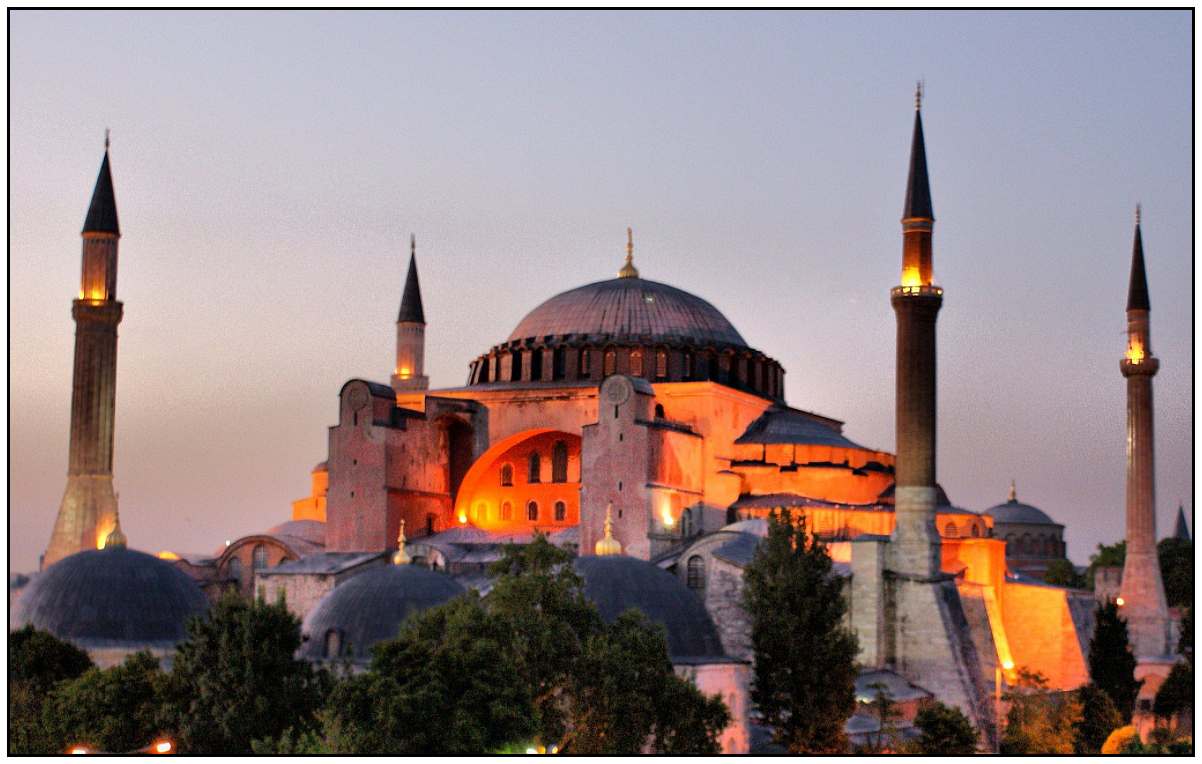 (6 Aug.) A miniature replica of the Hagia Sophia will be built in Syria backed by the Russian government according to the Lebanese news agency Al-Modon. The move follows the controversial decision by Turkish President Recep Tayyip Erdogan to turn the historic Hagia Sophia site in Istanbul from a museum back into a mosque. Erdogan's decree followed a ruling by the Council of State, Turkey's highest administrative court.
(6 Aug.) A miniature replica of the Hagia Sophia will be built in Syria backed by the Russian government according to the Lebanese news agency Al-Modon. The move follows the controversial decision by Turkish President Recep Tayyip Erdogan to turn the historic Hagia Sophia site in Istanbul from a museum back into a mosque. Erdogan's decree followed a ruling by the Council of State, Turkey's highest administrative court.
The Syrian replica will be built in the Western province of Hama. "Russia will provide the necessary funding to build the church which will be a miniature version of the Hagia Sophia," says Al-Modon. Work is scheduled to begin on site later this month. The project is led by the pro-regime militia leader Nabeul Al-Abdullah who obtained approval from the bishop of the Greek Orthodox church in Hama. The Hagia Sophia planned for Syria will subsequently operate as an Orthodox venue.
Russia is an ally of Syria's president Bashar al-Assad. According to Al-Modon, Russia is "angry with Turkey" over its decision to revert the sixth-century Hagia Sophia church into a mosque. The Russian lawmaker Vitaly Milonov told the unverified Riafan news agency that "unlike Turkey, [Syria] is a country that clearly shows the possibility of peaceful and positive interfaith dialogue," adding that "Orthodox Christians in Russia can help Syria with construction." Both the Turkish and Syrian embassies in London had not responded to a request for comment at the time of writing.
Hagia Sophia also features in the exhibition Shared Sacred Sites, which is due to open at the Cer Modern contemporary art space in Ankara this winter (October-December). The show opened at the Depo venue in Istanbul early last year when it included material linked to the Hagia Sophia site. In 2017, the exhibition was also held across three sites in Thessaloniki in Greece.
Crucially, the Shared Sacred Sites project focuses on interfaith dialogue "at a time when the Turkish government's decisions are further polarising Turkish society and simmering the fault lines between secularists and conservatives," says the Al-Monitor news website. The Hagia Sophia section will be included in the Ankara exhibition, featuring the photographs of Izzet Keribar.
According to the Depo website: "The Shared Sacred Sites project examines a diverse range of locations in the Mediterranean, the Middle East and the Balkans where the three Abrahamic religions have coexisted… The project argues that cross-cultural co-existence has been a viable way forward, out of the essentialism, isolationism, and hatred that have often come to characterise the present day." [read more~~]
COMMENTARY: A chapel of 4 x 4 x 4 meters is a rather miniscule replica of the great Hagia Sophia cathedral built by Emperor Justinian's decree in Constantinople, when that city was the capital of the Greco-Roman Empire. This "mini Hagia Sophia" might accomodate 4 or 5 people, whereas the original could accomodate thousands.
BELARUS: "WHY SHOULD WE PAY THE STATE TO PRAY IN OUR OWN CHURCH?"
by Olga Glace: Forum 18 News Service
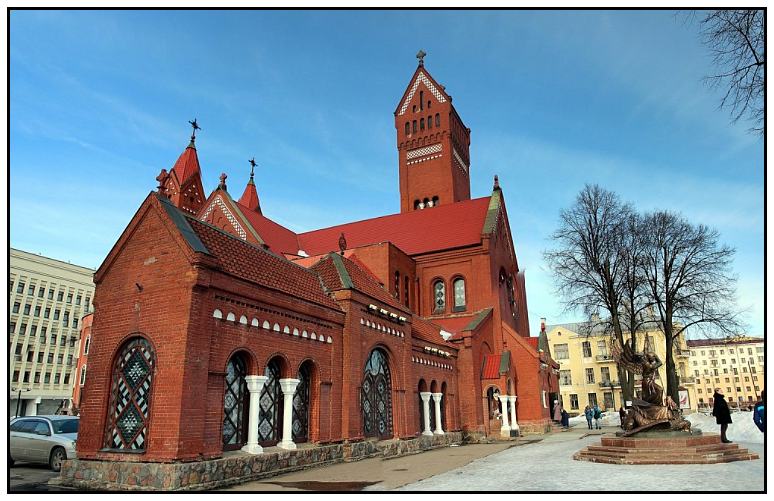 (12 Aug.) Minsk's historical Catholic Red Church parish faces large financial demands from the state for building work it did not agree to and which it cannot afford. It is unclear why this parish is facing these demands, as no other religious community has faced them. City officials refused to explain to Forum 18 the large sums demanded. Catholics in Mogilev, Grodno and Bobruisk have failed to regain ownership of historical churches they use.
(12 Aug.) Minsk's historical Catholic Red Church parish faces large financial demands from the state for building work it did not agree to and which it cannot afford. It is unclear why this parish is facing these demands, as no other religious community has faced them. City officials refused to explain to Forum 18 the large sums demanded. Catholics in Mogilev, Grodno and Bobruisk have failed to regain ownership of historical churches they use.
In Belarus' capital Minsk, the Catholic Church of Saints Simon and Helena (known locally due to its brickwork as the Red Church) is facing a large financial bill from the state, as well as just under 13,000 Belarusian Roubles (about 5,300 US Dollars) a month. As Red Church parish priest Fr Stanislav Stanevsky asked independent news agency Naviny.by on 13 July: "Why should we pay the state 13,000 Belarusian Roubles a month to pray in our own church?"
The Red Church is a historical Catholic church built in central Minsk in 1910 and which was confiscated during the Soviet period. Catholics were allowed to use the building again from 1990. The state still owns it, and Minsk city authorities claim to have spent more than 5,000,000 Belarusian Roubles (about 2,030,000 US Dollars) restoring the Church building. People associated with the Red Church told Forum 18 that the authorities did not agree with the parish about the work to be done. For example, Forum 18 was told that from at least 2015 onwards the authorities have been told that the basement regularly floods with rainwater, causing structural damage. This is the most serious problem the building has, yet neither this nor various other problems the authorities have been told of have been dealt with.
It is thought that the authorities only did the work to make the outside of the building look good for tourists, for example visitors to the 2019 European Games, an athletics tournament held in June 2019. Also, the parish was not told before the work how much the authorities would charge the parish. People associated with the Red Church think that it would take them at least 75 years to pay the authorities the current amount they are demanding. "It looks like the state without asking the parish decided to give us a large debt, and now demands that we pay them," Catholics told Forum 18.
The Red Church is an unusual case, and it is unclear why Minsk authorities have decided to impose such an enormous financial burden on the Church. The authorities have refused to explain their reasons. Minsk Property told Forum 18: "Minsk Property does not give comments." Fr Yuri Sanko of the Catholic Bishops' Conference told Forum 18 that "we are not going to take any formal legal steps until we try to clear up the situation by negotiation." [read more~~]
COMMENTARY: After the 1917 Revolution, the communists expropriated all church property and turned many church buildings into sports halls, Lenin Palaces of Culture, orphanages, or even breweries - that is, the churches they didn't demolish. Ever since the collapse of the USSR, churches have been struggling to regain legal title to their former buildings, often with a still-antireligious state bureaucracy putting obstacles in their way such as having to pay the current occupiers for another facility, etc.
THE COMMUNITY OF THE VILLAGE WHOSE PRIEST GREETED PUTIN CHANGES JURISDICTION TO THE OCU
from: Religious Information Service of Ukraine
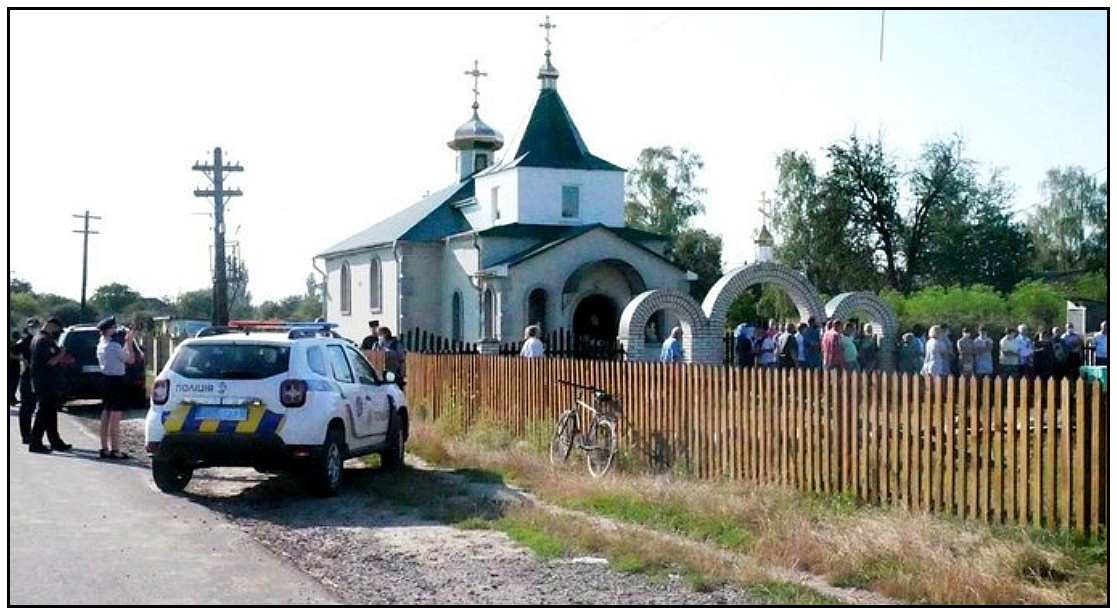 (10 Aug.) On the morning of August 9, a meeting was held in the village of Halynivka, Volodymyr-Volynskyi district, where they decided whether to transfer the religious community to the OCU. According to the villagers, this decision was supported by the majority of residents, especially after the news that the rector of the local Church, Fr Oleksiy Sharan of the UOC-MP, congratulated Putin on his name-day on Facebook, as reported by the media outlet Bug.
(10 Aug.) On the morning of August 9, a meeting was held in the village of Halynivka, Volodymyr-Volynskyi district, where they decided whether to transfer the religious community to the OCU. According to the villagers, this decision was supported by the majority of residents, especially after the news that the rector of the local Church, Fr Oleksiy Sharan of the UOC-MP, congratulated Putin on his name-day on Facebook, as reported by the media outlet Bug.
To date, Fr Sharan has already become the former rector of the Church - Fr Yuriy from the Diocese of Volodymyr-Volyn of the UOC-MP, was sent to serve temporarily in Halynivka instead of him. He also performed divine Services in the Church on August 9 with the parishioners of the UOC-MP at a time when the meetings of villagers were held in front of the Church.
At a meeting of villagers beside the temple, they unanimously decided to join the OCU and collected about 60 votes. In the Church, the service was not completed for a long time, so the supporters of the transition asked Fr Serhiy Misan, who arrived at the site from the diocese of the OCU, to hold a service outdoors. Prayers were read in Ukrainian in the churchyard. By the way, the event attracted a lot of media representatives. At first, they could not enter the church – its doors were closed. Later, they managed to get into the temple - about 15 parishioners of the UOC-MP had been staying inside and dispersed after the service.
Supporters of the OCU commented for the media that the church belongs to the community that had built it by joint effort, everyone made their contribution. Fr Yuriy, who was sent to serve in the village from the diocese of the UOC-MP, said: "What would you do if someone came to your place and said: the community decided to give your home to other people?" [read more~~]
COMMENTARY: Fr. Yuriy, the UOC-MP priest, isn't quite correct in calling this church building his home: it didn't belong to him and he didn't live in the church building. He might have lived in a rectory next to the church, but both the church building and the rectory belong to the people in the parish who paid for and built them. They have the final say about which jurisdiction they want to come under.
U.S. DEP'T. OF EDUCATION ACCUSED OF DIVERTING FUNDS FROM STUDENTS WITH DISABILITIES
from: Disability Scoop
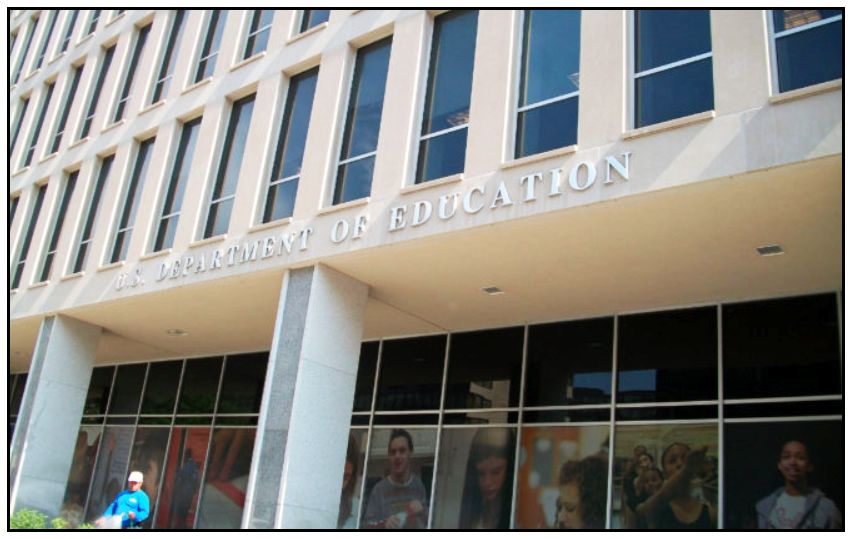 (13 Aug.) A lawsuit filed this week accuses the U.S. Department of Education of jeopardizing students with disabilities by misdirecting funds meant to help schools deal with fallout from the pandemic. Earlier this year, Congress included billions of dollars in funding for schools in the Coronavirus Aid, Relief and Economic Security, or CARES, Act. But rules issued by the Education Department this summer about how that money should be allocated allow a good chunk of the money to be shared with private schools.
(13 Aug.) A lawsuit filed this week accuses the U.S. Department of Education of jeopardizing students with disabilities by misdirecting funds meant to help schools deal with fallout from the pandemic. Earlier this year, Congress included billions of dollars in funding for schools in the Coronavirus Aid, Relief and Economic Security, or CARES, Act. But rules issued by the Education Department this summer about how that money should be allocated allow a good chunk of the money to be shared with private schools.
Steering the much-needed funds away from public schools is especially problematic for students with disabilities, according to the Council of Parent Attorneys and Advocates, or COPAA, the nonprofit that filed the suit and works to advocate for the rights of students with disabilities and their families. Unlike private schools, public schools are legally required to serve students with disabilities.
"It is reprehensible that this administration is pressuring schools to open quickly while simultaneously taking away the very resources that would allow them to do so safely and effectively," said Selene Almazan, legal director for COPAA. "As America's schools, communities and families are in the midst of an economic and health crisis, now is not the time to deprive millions of public school children the education services they need — including students with disabilities, a population that Congress specifically intended the CARES Act funds to benefit."
According to COPAA, as much as $1.5 billion could be diverted away from public schools under the rule just as these schools are dealing with higher costs for distance learning, changes to how they serve students with disabilities and other needs. Meanwhile, the state tax revenues that fund public schools have declined.
"At a time when students with disabilities are likely to have an increased need for academic and socio-emotional services and supports due to the disruption of their educations during the pandemic, the department through the (rule) has illegally limited the resources available to these students instead," the lawsuit states. [read more~~]
COMMENTARY: The article mentions "higher costs for distance learning," which isn't quite true. Teaching online is much less costly than paying for brick-and-mortar schools, there are several free distance learning software packages, and you can create a free website or one with your own registered domain name for as little as US $3.50 per month. Also, many websites for teaching disabled children are already up and running: Top 12 Websites For Children With Learning Disabilities. The problem is that most of today's teachers haven't learned how to write courses and teach over the internet, so the startup costs are largely paying teachers for their time and effort to get up to speed. I have developed distance learning software and courses and have taught online for over 20 years.
CHURCH AID GROUPS HELP THE POOR CAUGHT IN UKRAINE CONFLICT
from: The Catholic Register
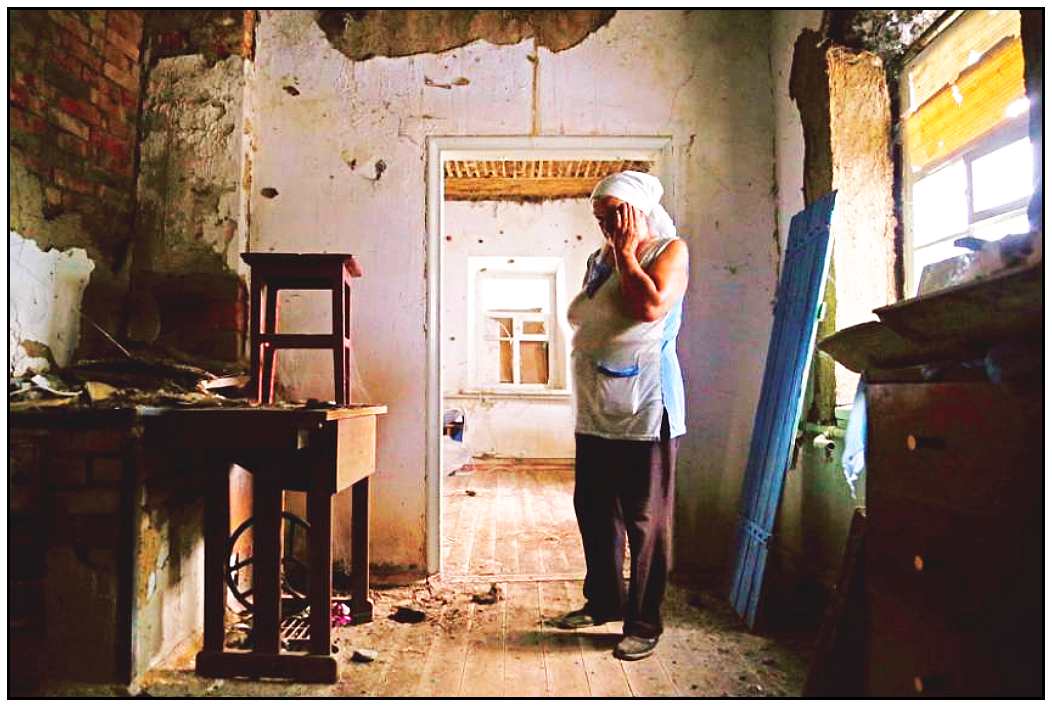 (15 Aug.) Ceasefires in Ukraine aren’t quite ceasefires. Despite a halt to fighting declared on July 27, the shooting has continued, and Caritas — the international federation of 165 Catholic aid organizations — carries on feeding and serving the poor caught in the crossfire.
(15 Aug.) Ceasefires in Ukraine aren’t quite ceasefires. Despite a halt to fighting declared on July 27, the shooting has continued, and Caritas — the international federation of 165 Catholic aid organizations — carries on feeding and serving the poor caught in the crossfire.
The six-year-old war between Ukraine and Russian-backed forces in the eastern Donbass region has killed over 13,000, including about 4,000 civilians. More than 30,000 have been wounded and nearly 1.5 million are internally displaced. The war stalemated long before this latest of about a dozen failed ceasefires and it was forgotten in Western media even before that.
"With time, media fatigue forms. That's obvious," said Catholic Near East Welfare Association project officer Anna Dombrovska. Between July 27 and Aug. 4, the Organization for Security and Co-operation in Europe’s special monitoring mission in Ukraine recorded 251 ceasefire violations, including three on Aug. 4. Basically, nothing has changed for hundreds of thousands of internally displaced Ukrainians who rely on Caritas and CNEWA for food and basic health care, Dombrovska said.
CNEWA finances two Caritas projects on the edge of the war zone. In the small city of Mariupol — on the shores of the Azov Sea, just over one-and-a-half hours' drive south of Donetsk — Caritas runs a soup kitchen. Like soup kitchens around the world, it has switched to takeout meals under the shadow of COVID-19. It costs nearly $80,000 a year to keep the soup kitchen open, of which CNEWA’s Canadian donors have contributed nearly $10,000 this year. The soup kitchen serves the poorest among over 100,000 internally displaced people in a city of half-a-million. "It feeds people who just don't have enough funds to survive," said Dombrovska.
In Kramatorsk, two hours drive north of Donetsk, Caritas uses CNEWA funds to operate home care services for the disabled — mostly seniors but many of them wounded in rounds of indiscriminate shelling and outbreaks of rifle fire. "They (Caritas) help them to basically live. They bring them food. They cook for them. They take care of their hygiene," Dombrovska said. CNEWA’s Canadian donors have contributed over $33,000 this year to keep the Kramatorsk home care service up and running.
Neither the weakened state of Ukraine nor the Russian-backed self-proclaimed state of the Donetsk People's Republic can offer the basic care Caritas performs, according to Dombrovska. [read more~~]
COMMENTARY: This simmering hybrid war has been going on since Spring of 2014. We in the West are tending to forget about it because of our concern for self-survival in the current Wuhan Virus pandemic. Perhaps if we were less concerned about our own well-being, we would help relieve those suffering even worse in other parts of the world.
ALL BELARUSIAN ORTHODOX CHURCHES TO PRAY FOR PEACE, WELLBEING OF PEOPLE - METROPOLITAN'S DIRECTIVE
from: Interfax-Religion
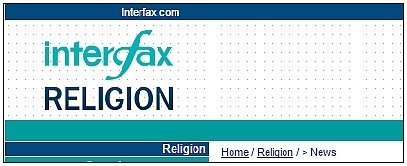 (14 Aug.) Metropolitan Pavel of Minsk and Zaslavl, the patriarch's exarch of all Belarus, has ordered that all churches and monasteries of the Belarusian Orthodox Church conduct prayers for peace in Belarus, the Belarusian Orthodox Church said on its website on Friday.
(14 Aug.) Metropolitan Pavel of Minsk and Zaslavl, the patriarch's exarch of all Belarus, has ordered that all churches and monasteries of the Belarusian Orthodox Church conduct prayers for peace in Belarus, the Belarusian Orthodox Church said on its website on Friday.
"With a sense of sincere pain and anxiety for the people of Belarus, who are dear to my heart and who are going through a hard time now, I appeal to all of you, the archpastors of the Belarusian Orthodox Church, and ask you, starting today [...] to offer special prayers to the Lord during every Divine Liturgy for giving peace and prosperity to the Belarusian people," Metropolitan Pavel said.
The statement also publishes a special prayer for the Belarusian people in both the Old Church Slavonic and the Belarusian language. Belarus has seen protests against the officially announced outcomes of the presidential election since the start of the week.
The Belarusian Central Elections Commission (CEC) announced on Friday that incumbent President Alexander Lukashenko garnered 80.1% and his principal opponent Svetlana Tikhanovskaya 10.12% of the vote. The Belarusian Interior Ministry has said police have detained some 6,700 people during the protests. [read more~~]
COMMENTARY: We should all be praying for peace with justice in Belarus, which has seen massive demonstrations met by police violence after the recent election.
OTHER NEWS HEADLINES:
ORTHODOX CHURCH OF UKRAINE EVICTED FROM CATHEDRAL IN SIMFEROPOL, RUSSIA-OCCUPIED CRIMEA
from Christian Persecution
THE DEATH OF SECULARISM IN RUSSIA, TURKEY, AND WESTERN CLUELESSNESS
from Orthodox Observer
CHRISTIANS OF DIFFERENT DENOMINATIONS HELD A CITYWIDE PROCESSION IN MINSK ON 13 AUGUST
from Religious Information Service of Ukraine
KOREAN BIBLE BALLOON LAUNCH INVESTIGATIONS EXPLAINED
from Mission Network News
SOME 30 BELARUSIAN PRIESTS JOIN FLASH MOB AGAINST VOTE-RIGGING IN ELECTION
from Interfax-Religion
MOSCOW REPRESENTATION OF THE OCA MARKS 50TH ANNIVERSARY OF GLORIFICATION OF ST. HERMAN OF ALASKA
from Russian Orthodox Church - Moscow Patriarchate
NEW CRISIS PREGNANCY SUPPORT CENTER TO BE INAUGURATED IN BUCHAREST, ROMANIA
from Orthodox Christianity
MEGACHURCH SUES CALIFORNIA STATE OVER BAN ON LARGE RELIGIOUS SERVICES WHILE ALLOWING MASSIVE PROTESTS
from Eurasia Review
GREECE UPSET THAT RUSSIA DEFERRED TO TURKEY OVER HAGIA SOPHIA
from The National Herald
NOW, OUR VIEWS:
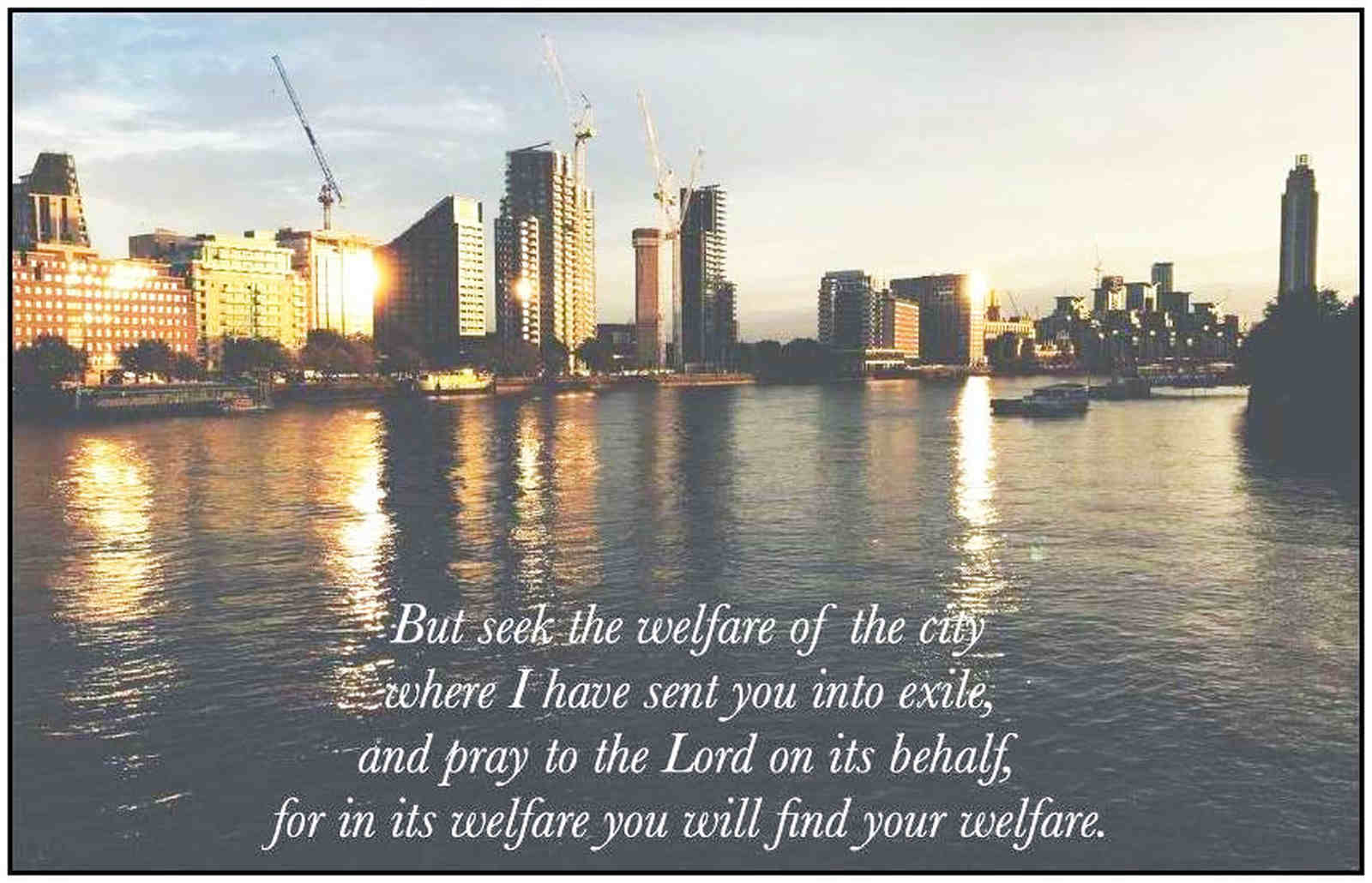 Seek the Welfare of the City, Part 1
Seek the Welfare of the City, Part 1
(Maybe you've read this before and you're wondering, "Why am I seeing this again?" But millions of other Christians haven't seen it! So please help us by clicking on the title above, then use the "share" buttons to share it with your social media friends. Thanks!!)
Where does the concept of "philanthropy" come from? Where did we get the idea of erecting hospitals, orphanages, homes for the elderly and infirm? Today we might think that these institutions were created by billionaires who made their money off railroads, steel mills or the stock market, or perhaps the government dreamed them up. But the historical fact is that these institutions for the public well-being were created during the one-thousand-year-long Byzantine Christian Empire. Only later did these ideas take root in Western Europe, and from there to the rest of the world.
When the people of Israel were carried away into Babylonian captivity because they had forsaken the Lord, many of them thought they should form their own closed cultural group to preserve their ethnic identity, having as little to do as possible with Babylon. But the prophet Jeremiah told them - "Seek the welfare of the city where I have caused you to be carried away captive, and pray to the Lord for it; for in its welfare you shall have welfare. ...For I know the thoughts that I think toward you, says the Lord, thoughts of peace, and not of evil, to give you hope for your future. You shall call on me, and you shall go and pray to me, and I will listen to you. You shall seek me, and find me, when you shall search for me with all your heart. I will be found of you, says the Lord, and I will return you from captivity". (Jer. 29:7, 11-14)
Thus the idea of seeking the welfare or well-being of society at large seeped from the Jewish nation to surrounding nations such as Babylon, Greece and Rome, but those nations limited such social programs to "their own kind," not sharing their wealth with other tribes and peoples. It took Christ's Great Commission to "Go into all the world and make disciples of all nations" before this idea of sharing one's well-being with others - even one's enemies - could take root.
For the first three hundred years Christians were "in captivity" of frequent persecutions, but still reached out in love to those around them. Why? Because Christ Himself was and is the great Philanthropos, the "Lover of Mankind." This divine love for mankind enables us to perform genuine philanthropy:
"The philanthropy of man is theologically grounded in the philanthropy of God. Although God is completely unknown in His nature, He becomes known through His revelation to mankind and in history as philanthropic and merciful. The philanthropy of God is apparent, among other signs, in the nature of man, in his destiny, and in his place in creation. Only man is created 'according to the image and likeness of God' (Gen. 1:26). Only he exists as a person who comes into communion with God. Only man has as his destiny an eternal progress, through a process of inner purification and sanctification, towards the attainment of the divine likeness." (Miltiadis Vantsos and Marina Kiroudi, "An Orthodox View of Philanthropy and Church Diaconia," Christian Bioethics, 13:251–268, 2007, Taylor & Francis Group, LLC, p. 253)
CONTINUE READING in our Hosken-News Blog, and write your COMMENTS there!
Recently I had been having some light-headedness and dizziness, so on Tuesday, 4 August, I went into the hospital for 3 days to start on a new medication, Flecainide, and a new blood pressure med to regulate my heart rate and a-fib (atrial fibrillation). It was a little worrisome: the reason for being in the hospital is that these meds could slow my heart down to zero, so I was hooked up to a heart monitor to alert the staff to come running if my heart stops. The meds seemed to be working, so I was discharged on Saturday, the 8th. But then the dizzy spells grew worse and on Tuesday, the 11th, I blacked out in the grocery store and hit my head on the floor. Cheryl drove me to the ER, I had a CT scan (no brain damage) and EKG: my a-fib is the problem. My cardiologist who is head of the department and top doctor in the hospital examined me: he admitted me to put me on a new heart med, Tikosyn, and stop the BP med. They would have to monitor it for 6 doses = 3+ days in the hospital... again!
They began monitoring my heart and it showed that my heart ventricle chambers would stop beating for 3-4 and 7-8 seconds at a time. After I was weaned from the old med, Flecainide, they started me on the new med on Wednesday morning. Friday morning, they gave me 2 "cardioversion" shocks to my heart with a defibrillator and after the 2nd shock, I came out of a-fib into normal sinus rhythm. But when the anesthesia wore off, I woke up and was back in mild a-fib. They ran another EKG in the evening that showed I'm in and out of mild a-fib, so Saturday at 1:00 p.m. they discharged me, wearing a heart monitor for the next 2 weeks (my wife Cheryl is also wearing a heart monitor for a month). My BP and pulse are a little high for my normal, but not far off for average men, so the new med, Tikosyn, seems to be working well. Your prayers for both of us will be appreciated!
God Does Not Lead Us Into Temptation
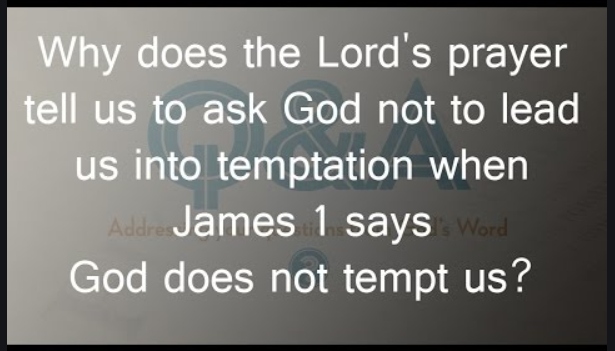 "But... but... but... doesn't the Lord's Prayer state - 'And do not lead us into temptation'?" - many people might ask.
"But... but... but... doesn't the Lord's Prayer state - 'And do not lead us into temptation'?" - many people might ask.
In the name of the Father and the Son and the Holy Spirit! Glory to Jesus Christ! Glory forever!
A few years ago, Pope Francis remarked that the Italian and English versions of the Lord's Prayer weren't quite accurate: the article God does not lead us into temptation, Satan does explains: "This is not a good translation," per the pope.
The article continues: "The standard versions of the prayer are translated from the Latin, which was translated from the New Testament in Greek. While he said nothing about ordering a new translation, Francis noted how the French bishops had decided that beginning Dec. 3, the first Sunday of Advent, French Catholics would change the line to the equivalent of 'do not let us enter into temptation.'"
This has been on my mind ever since I heard what the pope said. It is actually rather important: he admits that the original Greek text is more correct than the Latin and many other modern translations. Is this an admission that earlier papal imprimaturs on Roman Catholic Bibles were not infallible? Does it mean that our Bibles are not inerrant? What does the Greek text say?
"And do not lead us into temptation..." in most English translations uses the imperative mood of the verb. But the verb is actually in the subjunctive mood: "May we not be led into temptation" or we could put in in the more everyday, normal declarative mood: "You do not lead us into temptation, but deliver us from evil" that makes more sense and is consistent with the meaning of many other passages of Scripture:
For example, in James 1:13-14 we read - "Let no man say when he is tempted, 'I am tempted by God,' for God can't be tempted by evil, and He Himself tempts no one. But each one is tempted, when he is drawn away by his own lust, and enticed." God tempts no one. The true God is not the "Yin-Yang" of eastern religions, a combination of good and evil - that's pagan fatalism; rather, He is all-good, all-holy, and all-merciful.
And 1 Corinthians 10:13 states - "No temptation has taken you but such as man can bear. God is faithful, who will not allow you to be tempted above what you are able, but will with the temptation also make the way of escape, that you may be able to endure it." Instead of God initiating temptation, He provides a way for us to escape temptation. Sin is not inevitable for the Christian.
This brings up an important point: we must never say - "The devil made me do it!" - or - "I can't help it, that's just the way I was made!" This is shifting the blame to the devil, or worse yet, shifting the blame to God who created us. God created mankind and said - "This is very good!" - Genesis 1:31. He didn't create us badly or to do bad, He created us as very good beings.
God also created us with rationality to understand the likely consequences of our actions, and with moral freedom to choose between good and bad actions. We can choose to love and obey Him so that we will live forever, or we can choose to follow our own passions and suffer the consequences of bad actions: spiritual and finally physical death. St. John wrote -
"Don't love the world, neither the things that are in the world. If anyone loves the world, the Father's love isn't in him. For all that is in the world, the lust of the flesh, the lust of the eyes, and the pride of life, isn't the Father's, but is the world's. The world is passing away with its lusts, but he who does God's will remains forever" (1 John 2:15-17). Our own Passions, Possessions, and Pride are what lead us into temptation and sin: these were the three temptations of Christ and the three areas in which the devil tempts us also. We must take responsibility and resist the devil as Christ did.
All of this relates to another incorrect translation: in the Latin Vulgate Bible, Romans 5:12 stated - "Therefore, as sin entered into the world through one man, and death through sin; and so death passed to all men, for in him [masculine, referring to Adam] all sinned." The correct translation is - "...death passed to all men, in that [neuter] all sinned." But by accepting Jerome's Latin Vulgate translation of this verse unquestioningly, Augustine developed his doctrines of mankind's total depravity and God's absolute sovereignty in electing just a small number of people for salvation, damning the rest to the eternal fires of hell: we hapless humans have no choice, no moral freedom to love and obey God, we're all totally depraved, it all depends on God's predestining who is among the elect. Wrong! The correct meaning of Romans 5:12 is that death passed to all men in that all of us have sinned: see Romans 3:23 - "all have sinned and come short of the glory of God." We are responsible for our own decisions and actions.
To believe in God's absolute sovereignty and our total depravity would make God responsible for evil, for our own bad decisions and actions. But it strips us of our freedom to make moral choices. We can't change the cards we're dealt in life, but we can change how we play those cards. God is not a monster who arbitrarily, willy-nilly, decides to save just a few and damn all the rest. The idea of such a terrible god drives people to unbelief and atheism. We can really and truly say - "You do not lead us into temptation, but deliver us from evil." Our freedom rests upon our moral responsibility for our actions. Thank the Lord for creating us this way!
In the name of the Father and the Son and the Holy Spirit! Christ is among us! He is and ever shall be!
GO TO: Hosken-News Blog to SHARE THIS ↑ ESSAY with your friends or to WRITE YOUR COMMENTS.
Keep our websites free! Support Agape Restoration Society: click the "DONATE" button there.
Also, please Share Our Vision with your family & friends.
And bookmark our Amazon Smile link to shop at Amazon!
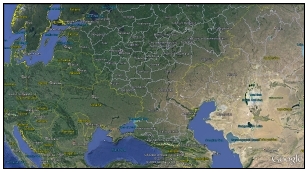 Please remember to pray for Christians in Secularized Countries, and for~~
Please remember to pray for Christians in Secularized Countries, and for~~
Your fellow-servants,
Bob & Cheryl
p.s. The Church is not a welfare program, it's more like an NFL team - No Free Lunch.
 (6 Aug.) A miniature replica of the Hagia Sophia will be built in Syria backed by the Russian government according to the Lebanese news agency Al-Modon. The move follows the controversial decision by Turkish President Recep Tayyip Erdogan to turn the historic Hagia Sophia site in Istanbul from a museum back into a mosque. Erdogan's decree followed a ruling by the Council of State, Turkey's highest administrative court.
(6 Aug.) A miniature replica of the Hagia Sophia will be built in Syria backed by the Russian government according to the Lebanese news agency Al-Modon. The move follows the controversial decision by Turkish President Recep Tayyip Erdogan to turn the historic Hagia Sophia site in Istanbul from a museum back into a mosque. Erdogan's decree followed a ruling by the Council of State, Turkey's highest administrative court.
 (12 Aug.) Minsk's historical Catholic Red Church parish faces large financial demands from the state for building work it did not agree to and which it cannot afford. It is unclear why this parish is facing these demands, as no other religious community has faced them. City officials refused to explain to Forum 18 the large sums demanded. Catholics in Mogilev, Grodno and Bobruisk have failed to regain ownership of historical churches they use.
(12 Aug.) Minsk's historical Catholic Red Church parish faces large financial demands from the state for building work it did not agree to and which it cannot afford. It is unclear why this parish is facing these demands, as no other religious community has faced them. City officials refused to explain to Forum 18 the large sums demanded. Catholics in Mogilev, Grodno and Bobruisk have failed to regain ownership of historical churches they use. (10 Aug.) On the morning of August 9, a meeting was held in the village of Halynivka, Volodymyr-Volynskyi district, where they decided whether to transfer the religious community to the OCU. According to the villagers, this decision was supported by the majority of residents, especially after the news that the rector of the local Church, Fr Oleksiy Sharan of the UOC-MP, congratulated Putin on his name-day on Facebook, as reported by the media outlet Bug.
(10 Aug.) On the morning of August 9, a meeting was held in the village of Halynivka, Volodymyr-Volynskyi district, where they decided whether to transfer the religious community to the OCU. According to the villagers, this decision was supported by the majority of residents, especially after the news that the rector of the local Church, Fr Oleksiy Sharan of the UOC-MP, congratulated Putin on his name-day on Facebook, as reported by the media outlet Bug. (13 Aug.) A lawsuit filed this week accuses the U.S. Department of Education of jeopardizing students with disabilities by misdirecting funds meant to help schools deal with fallout from the pandemic. Earlier this year, Congress included billions of dollars in funding for schools in the Coronavirus Aid, Relief and Economic Security, or CARES, Act. But rules issued by the Education Department this summer about how that money should be allocated allow a good chunk of the money to be shared with private schools.
(13 Aug.) A lawsuit filed this week accuses the U.S. Department of Education of jeopardizing students with disabilities by misdirecting funds meant to help schools deal with fallout from the pandemic. Earlier this year, Congress included billions of dollars in funding for schools in the Coronavirus Aid, Relief and Economic Security, or CARES, Act. But rules issued by the Education Department this summer about how that money should be allocated allow a good chunk of the money to be shared with private schools. (15 Aug.) Ceasefires in Ukraine aren’t quite ceasefires. Despite a halt to fighting declared on July 27, the shooting has continued, and Caritas — the international federation of 165 Catholic aid organizations — carries on feeding and serving the poor caught in the crossfire.
(15 Aug.) Ceasefires in Ukraine aren’t quite ceasefires. Despite a halt to fighting declared on July 27, the shooting has continued, and Caritas — the international federation of 165 Catholic aid organizations — carries on feeding and serving the poor caught in the crossfire. (14 Aug.) Metropolitan Pavel of Minsk and Zaslavl, the patriarch's exarch of all Belarus, has ordered that all churches and monasteries of the Belarusian Orthodox Church conduct prayers for peace in Belarus, the Belarusian Orthodox Church said on its website on Friday.
(14 Aug.) Metropolitan Pavel of Minsk and Zaslavl, the patriarch's exarch of all Belarus, has ordered that all churches and monasteries of the Belarusian Orthodox Church conduct prayers for peace in Belarus, the Belarusian Orthodox Church said on its website on Friday.
 "But... but... but... doesn't the Lord's Prayer state - 'And do not lead us into temptation'?" - many people might ask.
"But... but... but... doesn't the Lord's Prayer state - 'And do not lead us into temptation'?" - many people might ask.